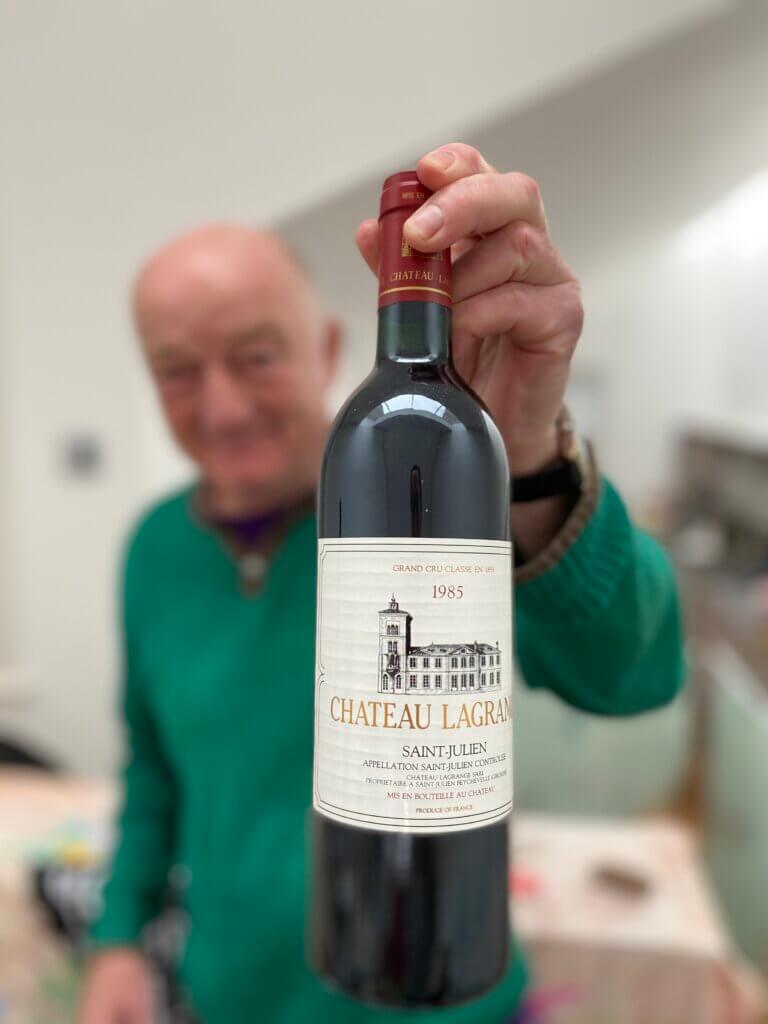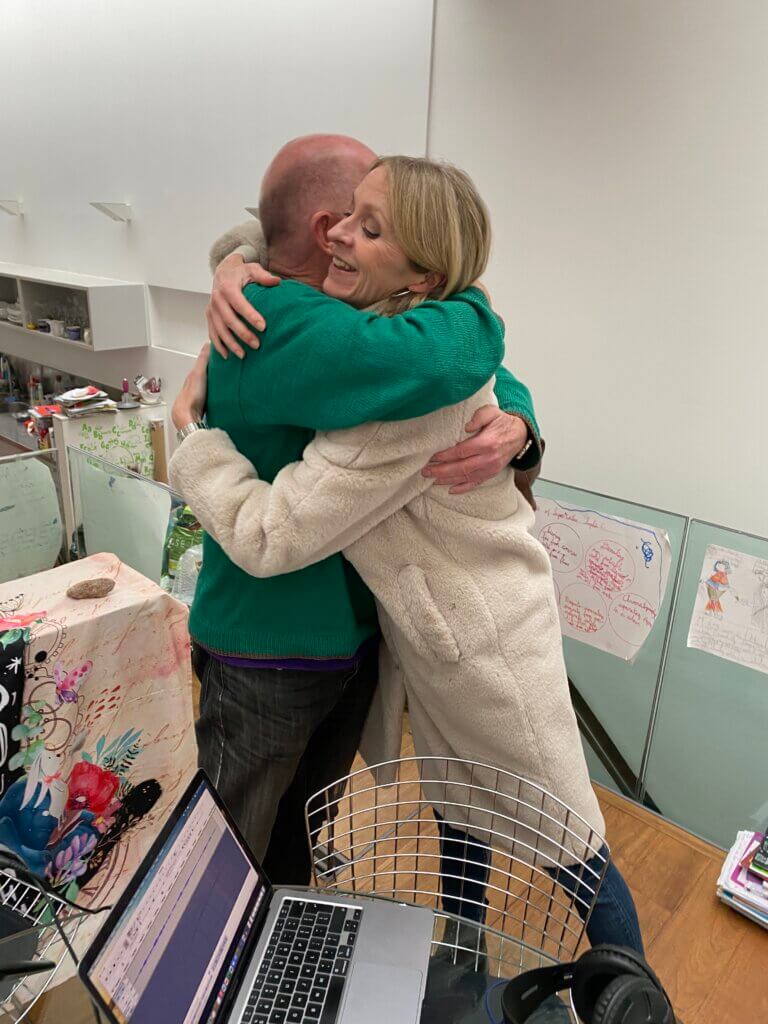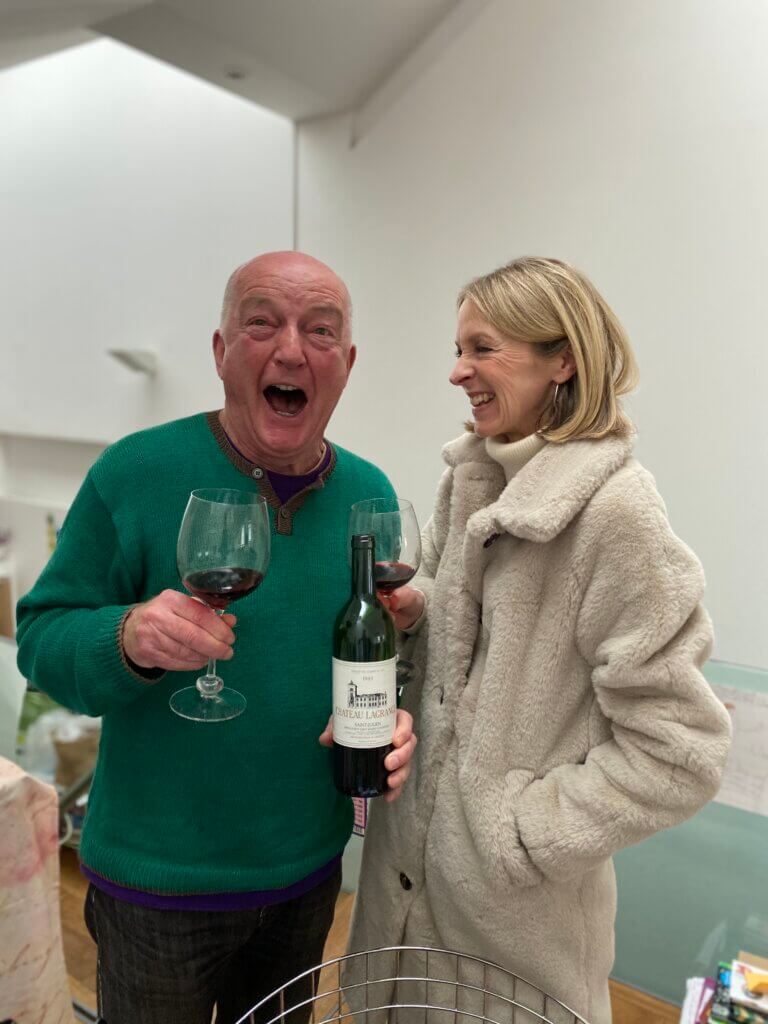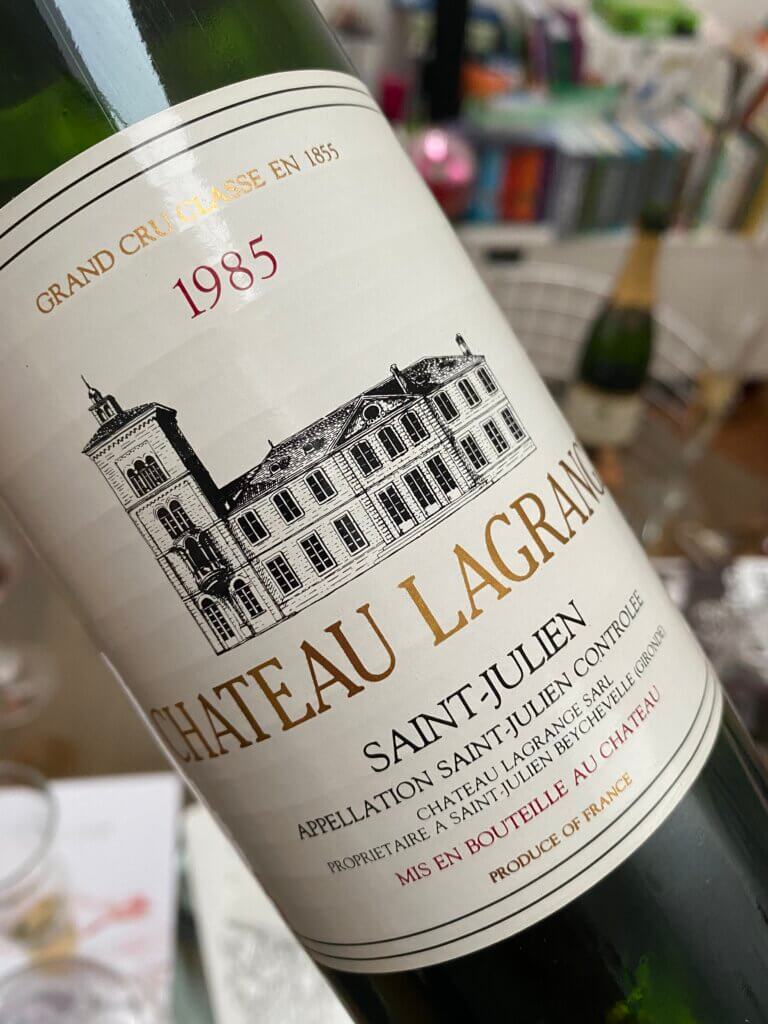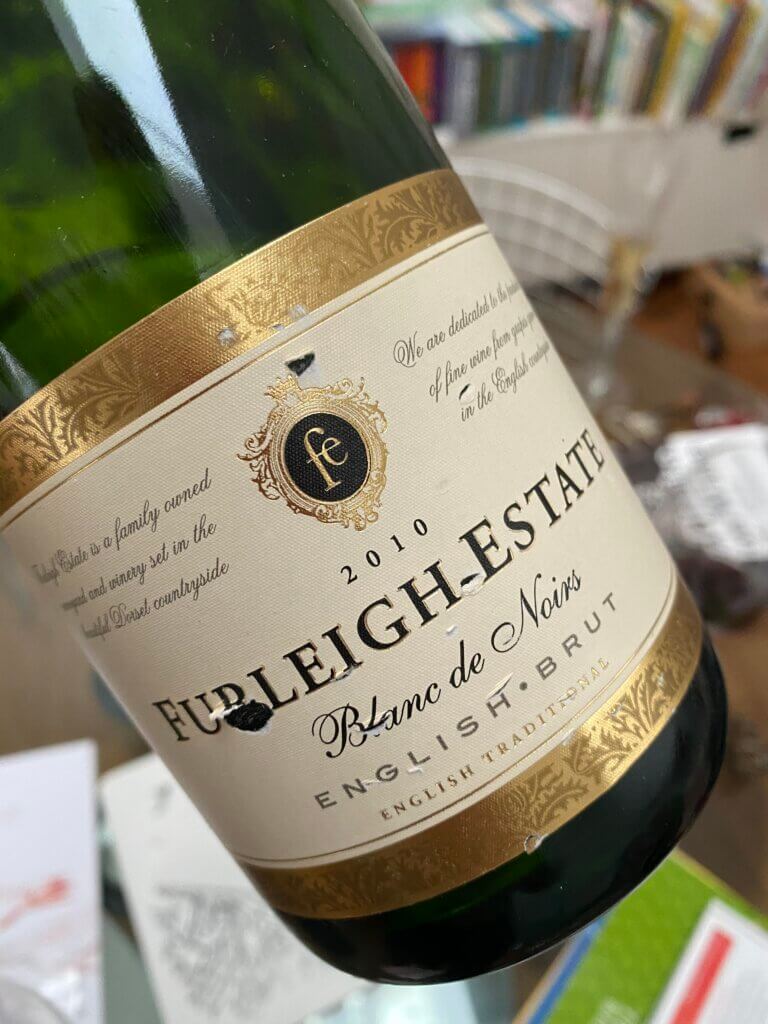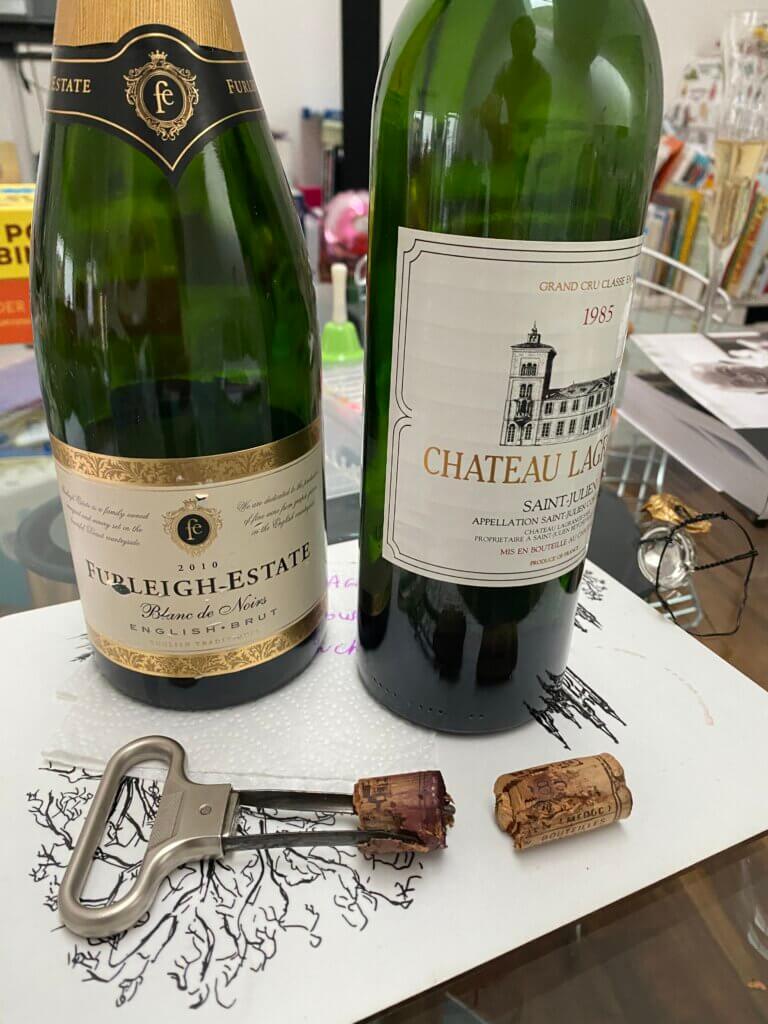- Season 3 Trailer
- Fake Booze
- English Wine: Now What?
- How to Buy Wine
- Bordeaux’s White Bank
- We’re Making Wine for Hope & Glory
- WTAF – Wine’s Alt Format Warriors
- The Oz Clarke EXCLUSIVE!
- Our Wines of the Year
- A Drink to Dry
- Coffee Dorks Meet Wine Nerds
- Burgundy 2020 Brief
- Getting to know the Côtes de Bordeaux
- The New Champagne
- The Magical Science of Taste
- Boxing Clever?
- Georgia 4 Ukraine
- On Natural Wine
- Fake Booze 2
- Adventures in Dosage
- Tasting 1982 Bordeaux
- Armenia’s Ambition
- The World’s BIGGEST Wine Competition
- Wine from the Arab World
- Why Bother Matching Food and Wine?
- Wine 4 Curry
- Wine 4 Roast Lamb
Summary
Oz Clarke has done most wine things you’ve ever thought of, and some you maybe haven’t even imagined.
But we’re not here to dwell on sex in a Margaux vineyard (though we do, of course, ask the question). This is about Oz Clarke OBE the wine titan, the great storyteller, the acclaimed author and broadcaster, surely the most successful person who ever claimed to have spent his, ‘whole life avoiding getting a proper job.’
We try not to slur as we work our way through a bottle of 1985 claret and discuss what Oz would criticise about wine today, climate change, natural wine, his favourite (and least favourite) wine grapes, Bordeaux, whether Burgundy should re-plant Pinot Noir with Syrah (heresy though it might sound)…and how to disagree.
A sponsored episode in collaboration with Academie du Vin Library, publishers of Oz Clarke on Wine, who are generously offering £5 or $5 off the cover price when you use the discount code WINEBLAST5 at www.academieduvinlibrary.com
NB: To see the Running Order/Chapter Headings, simply click on the ‘bullet list’ icon on the green embedded player above.
‘Life, life, life!’ Oz Clarke
Starring
‘Christian Moueix said you can never really understand a wine until you’ve had sex in the vineyard. I’m fond of Margaux to this day.’ Oz Clarke
Images
Oz Clarke transcript
Susie Barrie MW: Oz Clarke, I have known you for 30 years. You are still as passionate about wine as you ever were, as far as I can see. What is it that gets you out of bed in the morning?
Oz Clarke: Well it’s everything. It’s certainly not only just wine. I think of wine as one of the delights of life, along with music and eating and I don’t know, driving the car out into the country if necessary. Certainly things like walking along a cliff top, seeing the English ocean, wondering whether it’s warm enough to have a swim. Thinking: is there a pub around the corner there?
Life, life, life!
I just think that wine is a thrilling thing to have become a bit of an expert in. A thrilling thing to be a real enthusiast for.
It’s just part of these wonderful threads that we’re lucky enough in this generation, we’re lucky enough to have a bunch of threads, which you can wind into a fabulous quality of life. And this wine, good wine, any wine, if it’s drunk in the right mood and shared in the right way, is an exciting, glistening thread in that little bundle of life.
Susie Barrie MW: So we’re here to talk about your book, Oz Clarke On Wine, and it’s a book that’s both personal and professional.
You talk about your life and also wine from all around the world. Now it’s clear from the book you’ve never been afraid to challenge the establishment. So what do you see right now that needs to change in the wine world that you’d happily rail against?
Oz Clarke: I think I’ve been railing for quite a long time now against excessive alcohol, excessive ripeness.
Much as I like some of the international consultants – viticultural and wine consultants – I think their influence has gone far enough. I think they did an enormous amount of good in the 1980s and 1990 probably. And they don’t necessarily do good any longer.
I think that the scientists who created all our modern yeasts and all our modern enzymatic treatments and all the rest and probably, the ones who created all kinds of ways of chemically managing vineyards, did a great deal of good. And now have begun to do far more harm than good. Those same scientists, by the way, let’s take yeast: the people who created all these yeasts (and there are, there are thousands of fabulous yeasts on the market from the different yeast companies). So many of them were to actually maximize the creation of sugar, to maximize the creation of alcohol. They need to use that same expertise now to reverse the process. To start finding ways of reducing the conversion of sugar, reducing the creation of alcohol.
It’s the same as the people in the vineyards. They’ve taken all those scratchy, scrabbly, scrawny old gobelet vineyards all over the place and made them into fantastically impressive-looking vertical shoot position, military parade ground stuff, which of course VSP vertical shoot position is a sugar factory. It’s fantastically efficient. Thank you fellows for showing us how to do it. Now can you show us how to stop doing it? It’s the same old thing. I think a lot of the great progress that we’ve made now using the same expertise, now needs to be reversed.
Susie Barrie MW: And do you think that’s particularly in light of climate change?
Because I know you spoke up very early about the dangers of climate change. You met with serious pushback at the time. I think you were giving a speech in New York for Wine Spectator at some huge event and people were literally walking out in droves. Only a few stayed and listened to you. You were clearly right. A: how did it feel at the time to be pushing against a wall of opposition, but B: what do you think to that now?
Oz Clarke: It certainly it was, it was a pretty salutary moment for me.
I was the keynote speaker at the New York wine experience for the wine spectator and I stood up and thought, okay, you’ve got to be brave about this. It was 1993 and I stood up and said to these serried ranks of all the top producers in, particularly France but also Spain and Italy and places.
You’ve got to think again about what’s happening around the world. I started talking about the rising seas and changes in climate and projections of what’s going to go on. And started talking about what was going to happen to our vineyards. And when I began to touch upon Bordeaux and Burgundy and Piedmont and these places, people just got shocked and there was a sense of absolute shock and then anger in the room.
And then row after row of these people would just get up and storm out of the room. And I always remember four people didn’t storm out. They came, they stood up and walked to the now empty front row and sat in front of me in the front row and said, ‘we’re listening’. And that was Miguel Torres from Spain, Piero Antinori and Angelo Gaja from Italy and Christian Moueix from Bordeaux. I have always been grateful for that,
Susie Barrie MW: So what do you think they should do? What should individual producers do to combat climate change?
Oz Clarke: I think it’s back to the future.
I think we should make our viticulture less efficient. I think we should, we should consider going back to gobelets, it’s a less efficient way to grow your grapes and therefore that maybe what’s needed. The old California sprawl, which is another version of it. I have to say to the Californian guys, some of those wines they made in the seventies up to about the mid eighties are still fabulous today and have far more personality than most of the wines that are coming out of somewhere like the core of the Napa Valley at 15.5% alcohol nowadays. And those were at 12.5 % alcohol. I don’t know whether we can do 12.5% alcohol anymore because we’re now warmer. It may not be possible. You look at an old Shafer or something like that. That’s 12.5% alcohol. The same way as you look at an old Grange it’s 12.5% alcohol. You look at Lynch Bages 1982, it’s probably 12.5% alcohol.
Susie Barrie MW: So aside from changing your vine training and trellising. What about varieties? Do you think people should seriously consider, for example, Burgundy should move from Pinot to Syrah, and Bordeaux to start planting, it could be into Douro varieties, frankly, but what do you think? Is that possible? Would people really take that seriously?
Oz Clarke: I think it’s perfectly possible.
After all, if you say to a Burgundian, ooh , you know, that’s a lovely Chardonnay you’re making, he says ‘I do not make Chardonnay I make Meursault.’
And you say, well, it’s a jolly nice Pinot noir. And he says ‘I do not make PN I make Gevrey Chambertin’. So what he’s basically saying is that the grape is the locomotive for the terroir.
The great Aubert de Villaine at Domaine de la Romanee Conti, says, ‘Pinot noir has no character’. It is everything. And yet it is nothing.
But if you’re really saying that because of, for hundreds of years, maybe thousands, Pinot Noir has been the locomotive that worked for those bits of land. Now, if those bits of land are going to stay famous for another hundred years, maybe they need a different locomotive. It may be that locomotive is Syrah. There is some already planted in, in Beaujolais and the word is there’s already quite a lot dotted about in the Cote d’Or. But maybe its moment has come.
After all the great Cote Roties they said, ‘ah, ça Pinotte’, which means: this is now tasting like burgundy.
Susie Barrie MW: Now, I’m going to move on to natural wines.
They’ve recently kind of challenged the traditional wine world, the idea, the whole notion of natural wines. And you in turn have kind of challenged the evangelists, saying that wines first duty is to just taste good and some, or several natural wines just don’t necessarily taste good.
Do you think the future of wine is more and more natural. or do you think natural wines’ importance is going to be relatively short-lived, and only really kind of relevant in terms of challenging standardisation and sameness that we’ve been subjected to in the nineties and noughties?
Oz Clarke: I think that its role to challenge cynicism in wine-making, to challenge the agro-industrial world of winemaking, to challenge vast homogenization of winemaking, I think the natural winemaking movement, ie completely non-intervention, was an entirely plausible movement by a generation of people who cared a lot about that.
I know natural wine goes back far further than just now, but it’s really this last generation who’ve really taken it on board.
And I think when you look around our woke generation, we’re living in a woke period of time at the moment. It completely rings true with them that one should not interfere with what nature gives us.
But the idea that you’re not making human interferences is surely not true. Surely a good natural winemaker is making loads of human decisions every single day, which are actually transforming that wine. And I would say that that we’ve made fabulous progress in making life easier for people not to make mistakes, making life easier to create this frankly artificial drink called wine, which would otherwise be vinegar.
I think it’s an important movement. I think it’s a movement, not an ideology. I think that for a certain section of wine drinkers, it will be very important just as the kind of way their food is created, will be very important, the kind of clothes they wear will be very important.
I don’t think it’s necessary for the vast majority of wine producers or wine drinkers to get completely hooked up on the idea of natural.
I think sustainable is a completely different matter.
I think we should all, especially here in 2021, with what we know about climate change, what we know about ecological challenge, I think we should all in our lives naturally be adopting a sustainable lifestyle. And I think we all can. I don’t think that it’s one of those things that is out of reach. Anybody who can afford the odd bottle of wine can afford a sustainable outlook on life.
Susie Barrie MW: Now, just moving on, in Oz Clarke on Wine, you write that, ‘the grape variety is at the very heart of the different flavours in wine’.
You go on to choose the grapes that you feel have had the greatest impact on the world of wine, Now we’ve done podcasts on the best white wine grapes and the best red wine grapes. We had loads of people who voted for their favourites and they got pretty hot under the collar about this. We had things like Riesling, Chardonnay, Sauvignon at the top of the whites, but also things like Assyrtiko and Furmint, Savagnin which I love, Ribolla Gialla, Timorasso, those kinds of crazy grapes. In terms of reds, we had Pinot Noir, Syrah, Nebbiolo also Cabernet Franc, but then things like Sagrantino, Kadarka, Merenzao.
So we wanted to ask you, Oz Clarke: if you had to choose one or two red and white grapes that you just love, that you would take to your desert island, what would they be?
Oz Clarke: How long can the pause be before I work it out what the answer is?!
Because I think with something like, red wines, I am thrilled by the number of old varieties, particularly around the Mediterranean basin that are all beginning to stand up and say, ‘Hey, I’ve been here for hundreds of years. I can cope. I can cope, but only about six of me left.’ Um, Italy’s got lots of them. Greece has got lots of them. Uh, France has got a fair number. Spain, Portugal, those kinds of things. Uh, white wines are almost more impressive.
As a generic, I’m really excited about what the old grape varieties can do.
But when it comes down to my favourites, I would still stick with Chardonnay.
As a second white variety, if it’s just the sheer delight I’ve had for so many years, I would choose Sauvignon Blanc.
If it’s for more fascinating things that might go on in my brain and my heart when I’m drinking, I could choose Assyrtiko or I could choose Furmint or I could choose Bourboulenc.
I could choose lots of other ones, but Chardonnay still sits on top of all those. It goes through bad times and good, but it still sits on top.
And for red grape varieties, I get excited every year by new things I discover in Greece or Italy or Turkey. Or the revival of strange bits and pieces in places like Rioja, Ribera Del Duero, all these places, Galicia.
But I would put Syrah as the most endlessly adaptable, fascinating grape variety. And I would plant it in much cooler places than it’s often planted now. And I would try and take it away from that template of high alcohol and new wood. I think it doesn’t need high alcohol or new wood and it is far better without it.
And I would put Bordeaux not just Cabernet Sauvignon, and I would largely remove Merlot from my favourites. I’m afraid in the 21st century, I am tired of big, heavy overripe jammy thick, over-made Merlots.
This is, there’s too much. I mean all Cabernet, Merlot, all of them have been planted in some of the wrong places, but Merlot particularly because it’s so easy to sell. So I would actually largely remove Merlot from my requirements, but I would keep the two Cabernets and Petit Verdot.
I think Petit Verdot is a fabulous grape. I think it’s coming into its own now. I think Cabernet Franc is showing that amazingly it’s better able to cope. Everyone said ‘oh it’s only, it’s only cool climate only Loire’. It isn’t. It’s actually better able to hold onto its character in warm conditions and at higher alcohol than most Cabernet Sauvignons are.
Susie Barrie MW: Interestingly enough, going back to the Merlot, we did find that Merlot didn’t get a lot of love in our survey or questioning on our podcast.
However, what I do want to do is just take you back to Bordeaux as a general idea for a moment. Because your first ever tasting was Bordeaux. Equally, as we’ve mentioned, you have championed the new world, saying the old world like Bordeaux was too fusty, but you’re still a fan of it. We know you are, you’ve written books on it.
Why is there still a fascination with Bordeaux?
Oz Clarke: Well, I’ll tell you what, one thing, by the way, I’ve brought an old bottle of Bordeaux up here. If you just feel like me, I think it’s got a moment of opening about it and let me see if I can…
It’s a 1985, which is a wonderful year, which again was poo-pooed by the old brigades: ‘No no, the vintage is too big. And the tannins won’t last and all the rest.’ Vintage too big?! Ch Lynch Bages 1982, one of the great 82s, it was way over a hundred hectoliters to the hectare. Pontet Canet – most of the great 1982s were completely out of kilter with the appellation controlee. Took not a blind bit of notice.
I think one of the things in the, in the future is, especially with in warm conditions is, you don’t need to over concentrate your fruit.
One of one of the problems with over concentration is you lose nuance. You gain a sort of boring respectability. You gain the ability to impress the impressionable. And you actually lose the joy of thinking endlessly – like around a table, when a really good bottle of wine comes out – it’s just that wonderful sense of sometimes it’s just silence. That’s just, and you can see everyone is smiling. Everyone is happy and everyone’s got a mouth full of something they’re rolling around and thinking, I wonder what that is. I wonder what that’s reminding me of. I wonder what that the memories of my life, memories of my relationships, memories, places I’ve been – all in a bottle of wine.
Well, that doesn’t happen with a bottle of 15.5% merlot. And it might happen with a bottle of 30 year old Bordeaux from a top property in a top village like St Julien. Possibly like this 1985, which I’m looking at at the moment, if I can get it open…
[INTERLUDE]
Susie Barrie MW: Cheers! I think we need to describe it to share it with our listeners. It’s quite a brick colour, isn’t it?!
Oz Clarke: It’s lovely. It’s got a lot of colour in it still, but these 85s are tremendous. Wonderful colour.
Susie Barrie MW: Oh moment, that smell is incredible! When Bordeaux is brilliant, it’s truly spectacular, isn’t it?
Oz Clarke: And it’s from a different era, isn’t it?! Will the 2015s taste like that in 30 years time? I don’t think so.
Susie Barrie MW: Never mind me – you describe that smell, Oz.
Oz Clarke: The old-timers talk about undergrowth and sous-bois. This has got..is it slightly musty? I don’t think it is. It’s the dampness of a wonderful November day when you’re walking in the New Forest.
Susie Barrie MW: It’s not musty, it’s just intriguing.
Oz Clarke: And it’s old things and it’s old wood and it’s old clothes and it’s old lovable people and it’s oldness. It’s happy oldness.
And then I look at it this colour. I know there’s going to be tons of flavour there. I know there’s going to be as much fruit as you could ever possibly want
Susie Barrie MW: I know there is. Cause I’ve already started drinking it because I can’t resist. It’s absolutely delicious. So perfectly balanced.
Oz Clarke: That’s why I buy Bordeaux. And shove it under the stairs.
I remember precisely when I bought this and I’ve been keeping it and keeping it and keeping it and just saying: for God’s sake, start drinking it, this to me, and this will get only get better in the next hour.
And it’s got, it’s got a sweetness to it, and yet it’s no sugar at all.
And I remember writing about that first ever Bordeaux I had, which is Leoville Barton 1962, I was saying that it was as though a dragon had sucked all the sweetness out of the fruit and just left the essence of blackcurrant without any sugar at all.
This is richer than that. But it’s the same idea that there’s no sugariness here. There’s just a beautiful ancient sweetness, which is beginning to get slightly ethereal, there’s nothing lumpish, there’s nothing thick on the palate. It flows over your palate.
Susie Barrie MW: There’s no one thing. Nothing fights.
Oz Clarke: Every mouthful’s gonna be different and better. That wine, thank God they gave me that wine, because it meant that from the very beginning I saw what Bordeaux could be.
And I think that your first time is in many things. If it’s exciting and good, it sticks in your heart and your spirit forever.
And this stuck in my spirit, absolutely stuck in my spirit. My first ever wine trip was to Bordeaux my first, well, my first mmm mmm – yes, my first that as well! – was in a Bordeaux vineyard. I’m not telling you her name. But it was…my first so many things in wine were Bordeaux…
[INTERLUDE]
Peter Richards MW: Oz, we’re enjoying this lovely wine. Susie’s had to nip off. You know, it’s just the two of us now, complete confidence…And I wanted to pick you up on something you did just mention – you lost your wine virginity in Bordeaux. But did I hear right that you lost your actual virginity in Bordeaux too?!
Oz Clarke: I’m not really sure that I should be talking about my actual virginity with you, Peter, just you and millions more… But Susie has gone I could possibly mention it. No, it was what I might call my vineyard virginity.
Christian Moueix said you can never really understand the wine until you’ve had sex in the vineyard.
And I look at Chateau Petrus and think: it’s very small. It’s very flat. And there are normally hundreds of Japanese and Chinese tourists with their iPhones. And I just say, I hope it was a new moon night!
Peter Richards MW: So you said I can’t ask about the girl involved. Can we ask which region? Which area? I mean was it Chateau Petrus?
Oz Clarke: It wasn’t, the appellation was Margaux.
Peter Richards MW: Margaux. All right. That’s leaves just enough mystery Oz, all right we’ll leave it there. Thank you for sharing.
Oz Clarke: And I’m very fond of this appellation to this day
Peter Richards MW: For that reason. So when we see you championing Margaux wines…
Oz Clarke: …you’ll know why.
Peter Richards MW: What do you drink when you’re not drinking?
Oz Clarke: Milk. I love milk.
Full fat. My local shop here used to bring up deliveries from a farm in north Devon three times a week. And I would go every delivery and get a litre. And it was always different. Now, I can’t do that at the moment. That farm is no longer selling or whatever.
But milk has an absolute terroir. Every single day, a morning milk and an evening milk for those cows. What they have eaten that day changes the flavour of the milk.
And if you then don’t pasteurize it and you just milk it, particularly something like a Jersey, which I’m particularly fond of Jersey, because the fat globules are genuinely different. And I think scientifically they are different to something like an Ayreshire, or a Guernsey, which are certainly more high volume cows.
If you can get, you can day by day, that meadow has a terroir and the terror is not only the place. It’s the rain, it’s the wind, it’s the sun, it’s the mood of the cows.
And if I had to just have a drink which endless satisfies me: good milk me.
Peter Richards MW: Give me a one-sentence tasting note of the best milk.
Oz Clarke: It sounds silly, but I can taste the cow.
Like wine, it coats the mouth, and it seems to be both rich and savoury and hinting on a tiny bit of sourness. But the sourness is so easily balanced by the beautiful richness.
Peter Richards MW: Delicious.
Now, Oz, the world of wine has changed beyond recognition in your lifetime.
I mean, sometimes we forget how far we’ve come but, as you remind us in the book, in the sixties and seventies, wine drinking in Britain really was the exception rather than the rule and the wine producing world was smaller then too. It’s totally changed now too.
What’s the future of wine?
Oz Clarke: Wine has got a glittering future.
If it opens its mind and if it absolutely opens its mind to what’s happening around us in terms of climate change, but also in terms of what people are starting to want in in life.
We are at this minute, and it won’t last forever, but it’s here at the moment, in this woke generation. We are in a turmoil. And it’s mostly a turmoil of people in their teens to twenties, to thirties. A turmoil which is to do with authenticity. It’s do it integrity.
Unfortunately it’s sometimes to do with not letting other people say what they think. But that is a darker side of our modern world. But the brighter side of our modern world is: be true to me, show me the good stuff. Show me where my food comes from and show me how it’s made. Show me why I should buy this. Show me the flavours that I like. Show me the authenticity, the integrity of them.
Well, honestly, if wine tells that story, it’s got as good a story as any drink.
It’s got a better story. Much as I like gin. It’s got a far better story than gin. I like whiskey. It’s got a far better story than whiskey. I like beer. It’s got a better story than beer. I like cider. It’s got a better story than cider. I like milk. Ah, perhaps it has, well, of course, it’s got a better story than milk!
We need to tell a better story.
And I think we need, maybe we need to be more light-hearted, actually, Peter. This isn’t a very light-hearted decade. It’s a struggle-some decade, a lot is hitting home: Brexit and COVID and climate change. It’s not an easy time to be light-hearted in public.
Peter Richards MW: Are we taking life a bit too seriously and can wine help with that?
Oz Clarke: I think we’re definitely taking life too seriously.
That doesn’t mean that life’s not very serious around us.
Life IS serious us at the moment, there’s some very, very serious issues to deal with.
It doesn’t mean we have to spend our life inwardly looking, groaning with the misery of dealing with it.
We could probably be more effective in dealing with it if we had a more light-hearted, gregarious, maybe slightly indulgent way of dealing with it.
Peter Richards MW: In the book you say one of the great things about wine is being able to disagree in a very civilized way. Have we lost that too?
Oz Clarke: We have lost that.
Honestly you must be able to disagree about wine. Wine is subjective. It’s absolutely fundamental that you should be able to disagree with a smile on your face with someone else who’s also got a smile on their face. It’s fundamental.
No one is right about wine. Probably no one is wrong about wine.
Peter Richards MW: At the end of the book, you say wine is ‘a delightful, largely unnecessary, but immensely enjoyable member of that group of activities and products that makes our lives more fun to live.’
How important is fun in life?
Oz Clarke: I think I think fun is tremendously important.
I think you can find fun probably almost anywhere. If your mood is right. Just be happy.
What is this human condition we’re in? If it’s about a vale of tears, I’ve read all of the 19th century Christian stuff about, ‘oh God, it’s all terrible. And you know, don’t worry. It’s all going to be better when you get to the other side.’
Maybe. But as far as I’m concerned, we’re here to try and have the happiest time we can in on this earth to try and fulfil things, to try and achieve things.
Hopefully the happiness will partly be doing good and being a good member of society. Being active in trying to make life better for ourselves and others, not just other people but for ourselves as well.
Fun.
Surely a smile, a joke, a laugh, a quip, a pleasantry, or a hug, a kiss. That is terribly important.
Peter Richards MW: Oz Clarke, thank you very much.
Oz Clarke: Cheers to you, Peter. My old friend.
Well, that will take a bit of editing!

